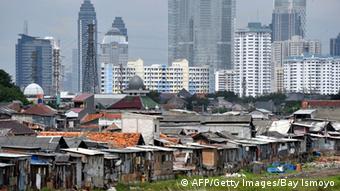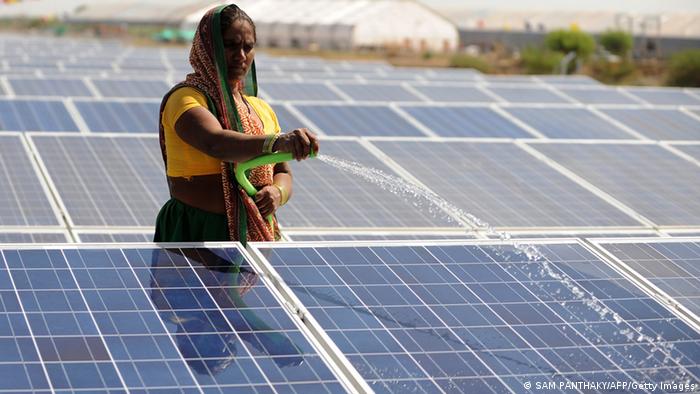The concept of sustainability has been gaining increasing significance across the world. IHS' Jane Okun Bomba talks to DW about the progress made in this area by Asian countries so far and the factors behind it.
2014 was a prominent year for promoting sustainability efforts. Governments and businesses worldwide are realizing that sustainability is crucial to ensure long-term economic growth and prosperity. As a result, there has been increased action aimed at incorporating sustainable development strategies and ideas.
At the same time, reporting on economic, environmental and social performance continues to improve globally. Sustainability is also one of the four major themes of this year's World Economic Forum in Davos, Switzerland. In a DW interview, Jane Okun Bomba, Senior Vice President of Sustainability at IHS Inc, a global analytics firm, says better focus and performance on sustainability will create more efficient companies and communities, and ensure the sustainability of those entities themselves.
DW: How are the global efforts at sustainability progressing?
Jane Okun Bomba: In 2014, we saw major advances in sustainability reporting and increased transparency expectations as the European Parliament passed a law mandating public disclosure of key non-financial performance measures for all European-based, publicly-listed companies with more than 500 employees.
While admittedly the EU is probably the most advanced region with regards to sustainability, the goal of this new mandate is to force more transparency into how these large companies operate their businesses.

Okun Bomba: 'Rapid population growth and urbanization in the region will continue to drive the need for accelerated progress in sustainability'
South Africa notably continues to lead the way as the first emerging market as well as the first stock exchange globally to introduce a sustainability index measuring companies on indicators related to environmental, social and governance, or "ESG" practices, since 2012.
In the US, there was increased momentum behind the efforts of the SASB - the Sustainability Accounting Standards Board - whose aim is to require standardized reporting, which includes industry-based material sustainability information - for companies which are publicly listed in the US.
Globally, the Global Reporting Initiative (GRI) published its new G4 reporting guidelines, which incorporates a strong focus on materiality in the data and metrics reported in sustainability reports. These guidelines will go into effect with reports published beginning in 2016.
What role does the concept of sustainability play in Asia?
In Asia, the past two years have seen some major progress in the area of sustainability and there is evidence of incremental improvement versus other regions.
Asian companies are incorporating sustainability into their strategies and business models and creating special committees and processes at the board and governing levels of their companies. They are identifying the greatest sustainability risks in their businesses and using them as a catalyst to drive innovation as a way to manage and mitigate those risks.
One unique feature is a provision referred to as ‘the two percent' requirement. Driven by the fact that sustainability and corporate social responsibility in India is still viewed largely through a philanthropy lens, this provision requires that companies establish a special CSR committee of the board of directors and that this committee ensures that at least 2 percent of the net average profits of the company be spent on CSR activities. If the company fails to spend this amount, the board must disclose the reasons for this failure in the company's annual report.Late in 2013, India passed its first updates to corporate governance laws in more than 50 years. Provisions under these laws include requiring companies to disclose executive salaries as a ratio to the average employee's salary and requiring that one third of a company's board be made up of independent directors and that at least one board member be female.
In another significant sustainability development in Asia, the Singapore Exchange (SGX) announced the mandate that all listed companies publish a sustainability report. Guidelines will be developed over the coming year, with the mandatory requirement expected in 2017 or 2018, but the rules will likely cover a wide range of performance metrics such as economic, environmental and social impacts of a company's business.
Stock exchanges in China, Taiwan and Malaysia already require listed companies to publish some form of sustainability report. Additionally in Singapore, a new regional sustainability index was launched by Channel NewsAsia, a Singapore broadcaster. The index covers a broad range of countries and lists the top 100 companies based on their results against a wide set of metrics that include environmental, social and governance performance. Furthermore, both Singapore and Indonesia passed acts aimed at reduction in haze pollution.
What are the main factors driving the need for a more sustainable economic approach in the region?
Rapid population growth and urbanization in the region will continue to drive the need for accelerated progress in sustainability. India and China have both announced plans to build a number of ‘smart cities' that will use technology to enhance operating effectiveness and make the use of natural resources more efficient.
Songdo, in South Korea, is leading the way as a model smart city, and is also part of the LEED-ND (Neighborhood Development) Pilot Program. Global mobility and urbanization megatrends are shaping cities of the future, which incorporate car-sharing, bike programs and urban development infrastructure, apart from minimizing the necessity for cars as well as reducing resource requirements and environmental impact.
What benefits could companies reap from this increased focus on sustainability?
Better focus and performance on sustainability will create more efficient companies and communities, and ensure the sustainability of those entities themselves. For instance, at IHS, we are driving the tenets of sustainability into our strategy and business model to ensure our own long-term, sustainable profitability. Corporate sustainability has become one of the primary values of our company and an integrated part of our culture.
In fact, we see our Asia Pacific region leading in many areas with LEED-certified offices and one the highest levels of employee engagement in volunteerism and community building. We believe that this is the path to a successful and sustainable future not only for IHS, but also for other companies.
Jane Okun Bomba is the Senior Vice President of Sustainability at IHS Inc.


No comments:
Post a Comment